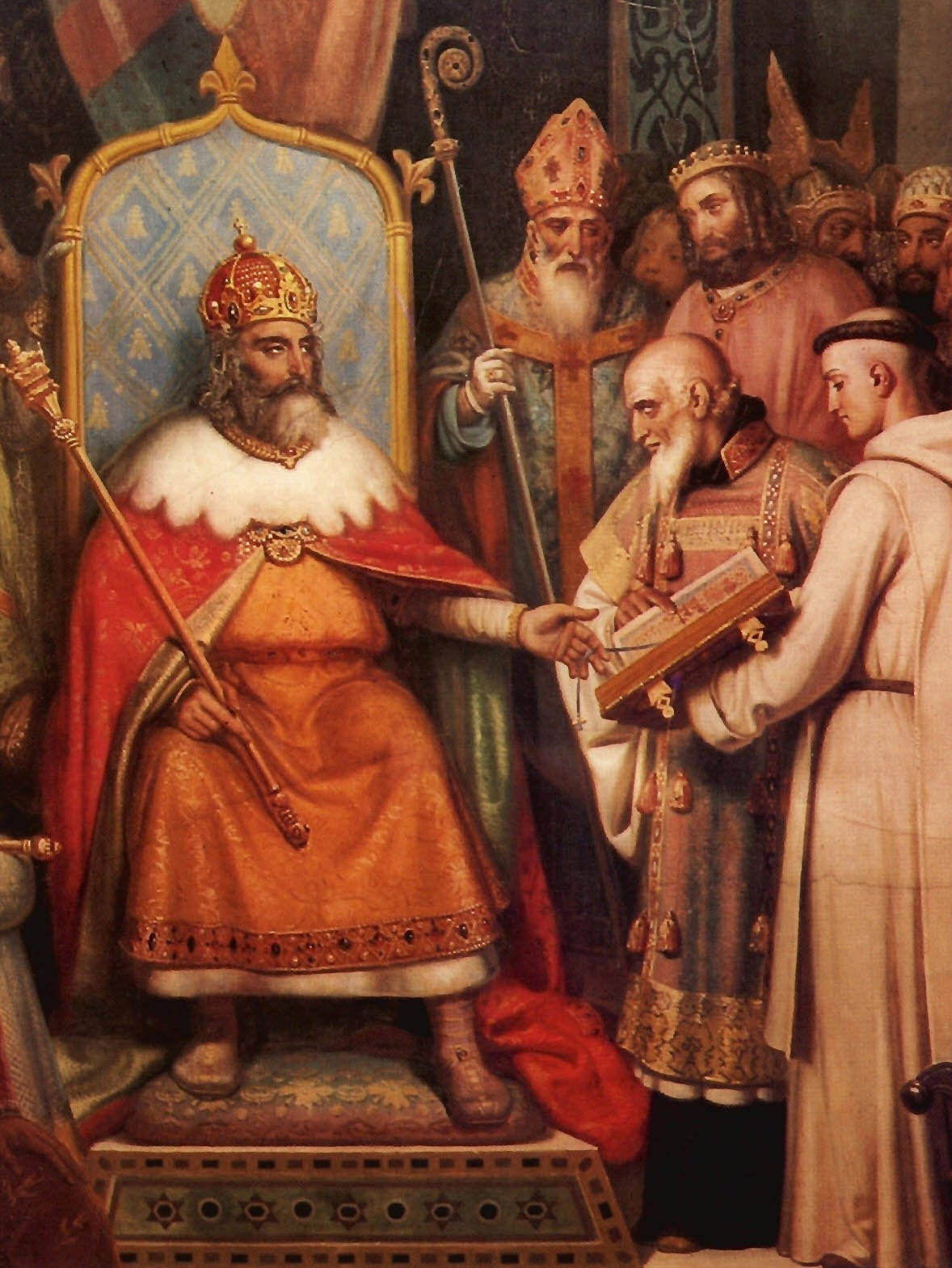By Kim Rendfeld
We know the British Saxon Osulf and Charlemagne’s son Charles (called Karl in my books) were close, but just how close remains a mystery.The intrigue centers on a poem by the courtier Theodulf. The Visigoth composed a parody of Virgil’s Second Eclogue, about the shepherd Corydon and his love for the boy Alexis. In Theodulf’s version, the prince, Karl, is playing a flute for Mochanaz, whose name is similar to Arabic muhannat, meaning catamite. Mochanaz might be Osulf. Theodulf’s poem praises Karl, but his father, grandfather, and great-grandfather are urged to scourge Mochanaz.
Osulf was a part of the prince’s retinue, but were Karl and Osulf lovers? Hard to say.
Karl was one of three heirs to Charlemagne’s realm, and he led soldiers into battle during the later years of his father’s reign. When the emperor wrote his will, he divided it among the three sons he had with the late Queen Hildegard. Louis got Aquitaine. Pepin got Italy. Karl got everything else.
Yet Karl never married and never had children. His two full brothers had married young and had fathered lots of kids.
Could the reason Karl remained a bachelor be that he was gay? We don’t know Karl’s sexual orientation, but attraction or love for a man would not prevent marriage to a woman. As long as the husband fulfilled his duty to his wife—the conjugal bed was her right as well as his—and sired children, what he did outside the marriage was between him and his confessor. Homosexuality was considered a sin, but most often it was tolerated on the same level as adultery (for men) and premarital sex (for men). If a man fathered a baby by a woman other than his wife, he was expected to acknowledge and support the child, but otherwise, no one thought much of it.
.jpg) |
| 1900 image of Charlemagne presiding over the Palace School (by Internet Archive Book Images, via Wikimedia Commons) |
Perhaps, Theodulf’s target was not Osulf but the Visigoth’s rival Alcuin, a scholar from York. Osulf was among four pupils who accompanied Alcuin from York to the Frankish court. In 781, Alcuin had met Charlemagne in Parma. Alcuin had already earned a reputation as master of the cathedral school at York, and Charlemagne invited him to lead the Palace School in Francia. Alcuin agreed, after he got permission from his superior upon his return to York.
Charlemagne had a circle of scholars in his court—the brightest minds in the realm. They might have had the egos to go with them. They were not above using their poetry to tease and snipe at each other.
Theodulf did not target Alcuin directly, although Alcuin might have loved other men. A missive to Arno, the bishop of Saltzburg, reads like a love letter, where Alcuin expresses deep feeling and physical longing. But Alcuin affections were for a bishop, albeit an influential one, not a prince. Theodulf likely saw an opportunity in Osulf, who caused Alcuin frustration. We don’t know what Osulf did exactly, but there are a few clues, none of them about homosexuality.
In a letter to Mercian King Offa about Osulf or another student whom Alcuin calls “my dear son,” the scholar asks the monarch not to “let him wander loosely or fall into drink. Give him boys to teach, and see that he teaches them with energy. I know he can, because he was a good student.”
 | |
| Detail from 1830 painting by Jean-Victor Schnetz (public domain, via Wikimedia Commons) |
Another manifestation of Alcuin’s frustration is in his interpretation of another student’s disturbing dream: “O Osulf, thou wretched one, how oft I have warned thee, how oft corrected! Much labour did I devote to thine uncle, that he should reform and begin to walk in the way of the commandments of God; and I told him that if he did not he would be smitten with the plague of leprosy; which thing happened to him. And to thee, my son, I predict of Osulf, of whom is this vision, that neither in this land, nor in the land of his birth, shall he die.” (Osulf would die in Lombardy.)
Knowing Osulf was a beloved, if flawed, pupil of Alcuin, Theodulf likely took aim at his rival by criticizing Alcuin’s failure to rein Osulf in. Theodulf’s poem seems to say more about the poet and his spite for a rival that a courtier’s relationship with a prince.
Sources
Alcuin and the Rise of the Christian Schools by Andrew Fleming West
Alcuin of York by George Forrest Browne
Alcuin, friend of Charlemagne: his world and his work by Eleanor Shipley Duckett
Charlemagne by Johannes Fried
“Presidential Address: England and the Continent in the Ninth Century: IV, Bodies and Minds” by Janet L. Nelson, Transactions of the Royal Historical Society: Volume 15: Sixth Series, edited by Aled Jones
The Life of Alcuin, Frederick Lorenz, translated from the German by Jane Mary Slee
Gay History and Literature
~~~~~~~~~~
In The Cross and the Dragon, a Frankish noblewoman must contend with a jilted suitor and the fear of losing her husband (available on Amazon). In The Ashes of Heaven's Pillar, a Saxon peasant will fight for her children after losing everything else (available on Amazon). Kim's short story “Betrothed to the Red Dragon,” about Guinevere’s decision to marry Arthur, is set in early medieval Britain and available on Amazon.
Connect with Kim at on her website kimrendfeld.com, her blog, Outtakes of a Historical Novelist at kimrendfeld.wordpress.com, on Facebook at facebook.com/authorkimrendfeld, or follow her on Twitter at @kimrendfeld.



No comments:
Post a Comment
Note: Only a member of this blog may post a comment.